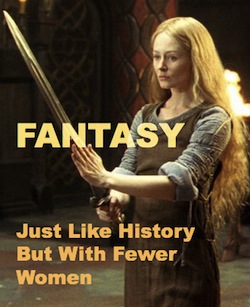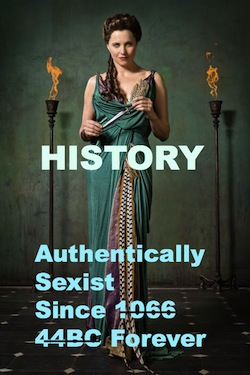There was a great, thoughtful article at The Mary Sue on one of my pet topics: the common justification of sexist fantasy fiction being that it’s historically authentic.
I am BUSY today, far too busy for a rant, but then I felt one coming on, and was worried I might end up with a migraine if I tried to stifle it. You know how it is. So let’s talk about sexism in history vs. sexism in fantasy.
WARNING, ACADEMIC IN THE HOUSE.
I agree with pretty much everything said in the Mary Sue article: when you’re writing fantasy inspired by history, you don’t have to take all the ingrained sexism of historical societies along for the party, and even when you do, you don’t have to write women in a sexist or demeaning way. Your fantasy will not break by treating women as if they are people too.
But my rant is actually not quite about that stuff at all. It’s about history, and this notion that History Is Authentically Sexist. Yes, it is. Sure it is. We all know that. But what do you mean when you say “history?”
History is not a long series of centuries in which men did all the interesting/important things and women stayed home and twiddled their thumbs in between pushing out babies, making soup and dying in childbirth.
History is actually a long series of centuries of men writing down what they thought was important and interesting, and FORGETTING TO WRITE ABOUT WOMEN. It’s also a long series of centuries of women’s work and women’s writing being actively denigrated by men. Writings were destroyed, contributions were downplayed, and women were actively oppressed against, absolutely.
But the forgetting part is vitally important. Most historians and other writers of what we now consider “primary sources” simply didn’t think about women and their contribution to society. They took it for granted, except when that contribution or its lack directly affected men.
This does not in any way mean that the female contribution to society was in fact less interesting or important, or complicated, simply that history—the process of writing down and preserving of the facts, not the facts/events themselves—was looking the other way.
In history, from primary sources through most of the 20th century (I will absolve our current century-in-progress out of kindness but let’s not kid ourselves here), the assumption has always been that men’s actions are more politically and historically significant to society, BECAUSE THEY ARE PERFORMED BY MEN.
Here’s an example from my honours days: most of the history books looking at Roman state religion were clear that women’s participation in the religious rituals of the state was probably less important or politically relevant, because women were excluded from making blood sacrifice. This was used as evidence, in fact, that women weren’t that important to politics in general. However, more modern and forward-thinking scholars pointed out that in fact the only reason why we assume blood sacrifice was an essential and a more politically important religious rite was because it was restricted to men. Plenty of rituals were restricted to women too, and those rituals were assumed to be less politically relevant on the whole. Guess why. Go on, guess. As it turns out, women did perform sacrifices (mostly of baked goods), and many of their rituals were private rather than public, but they were all performing religous rituals which were essential to the state. Different does not mean better.
Rome was a highly superstitious society which relied on all manner of rituals to feel safe and protected. Those rituals which were performed within the home were as important as those performed in public places—but they weren’t written about to the same extent because they were mostly done by women, often exclusively by women, and secrecy was a common element. There are many reasons why men didn’t write down the details (except when they interacted with court cases) and one of those reasons was, they didn’t know what those details were. Women’s history, sadly, was not much of a thing, and what words women did write down were not preserved over the next millennium.
Guess why. Go on, guess.
Women’s lives were not written down except on the rare occasions that they were useful tools in the politics of men, or where maligning/celebrating them was relevant to the politics of men, bu that doesn’t mean they weren’t really, really interesting by modern standards.
History is not society. It only covers one aspect. History is imperfect, and biased, and it always, always has omissions. The most common omissions are the bits that the writer of that history took for granted that his readers would know.
So how does this affect fantasy fiction?
 FANTASY IS NOT HISTORY
FANTASY IS NOT HISTORY
We have a tendency in fantasy fiction to assume that the military/warfare and the politics (two key elements of epic fantasy, with magic being a strong third) are male domains because this was usually the case in history.
Well, I will agree for the MOST part on the warfare aspect, though I think Battlestar Galactica showed us that you can have female characters on the front lines of your story and still tell very close to the same kinds of stories as you would have done if the soldiers were all men. The Starship Troopers movie, adapting a much earlier work, showed this too. Okay, those are science fiction, but fantasy does not have to be hamstrung by the social conventions of the past. If you want those social conventions in place for other story reasons then you can get around that too by bringing women into the story. Terry Pratchett’s Monstrous Regiment has a lot to say about the different kinds of women you might find on a battlefield, and the many different reasons why they might be there despite restrictive social mores. Or, you know, you could read some actual history, because for all its patriarchal leanings, you will find that women’s roles in war were a lot more varied than many people expect.
When it comes to politics, I’m sorry, but there are no excuses. Sure, women have been excluded from the public political process for large swathes of history and culture (except, you know, when they weren’t—even the supreme patriarchy that was Rome didn’t have complete control over the provinces, where female politicians and civil servants sprung up like weeds) but public is only one piece of politics. The Mary Sue article refers substantially to Game of Thrones, and that’s a very good example, but again you can look to history—as soon as there is any form of dynastic element to your politics, then women are IMPORTANT. Even when the political careers are solely male, those men have wives and families who have a stake in the proceedings and the outcomes, they have risks to take and campaigns to wage every bit as much as the men. And if the women’s politics are happening in salons rather than assembly halls… maybe you should be peeking into those salons. I can guarantee political DYNAMITE is going on in there. With finger sandwiches and mint tea? Why not?
And you know, if your political system is inherently and essentially misogynist and that is essential to your worldbuilding, then throwing a few women into that system to see what cracks first is actually the most interesting thing you could do. Like with science fiction where SCIENCE GOES WRONG is the most interesting plot.
Then there’s magic. There are no excuses here. None at all. Either you have a magic system which is inclusive of women, or exclusive of women, and in both instances, FEMALE CHARACTERS ARE GOING TO HAVE OPINIONS ABOUT THAT. If you really want a patriarchal, masculine magical system, then as with politics, the most interesting thing you can do is throw women at that system, to see where the cracks are.
So what are the take home messages here?
1. History is more interesting than most people think. Despite everything I have said, it also has quite a lot of women in it. Read some history. Read some more. Check out the social historians, because they’re the ones who tend to pay more attention to what everyone in a society are doing, not just the aristocratic men who think they’re in charge.
2. Treating female characters as people will make your fantasy more interesting. Not just to female readers. To readers who are people. And, let’s face it, most readers are.
3. Make your books better.
This article originally appeared on Tansy Rayner Roberts’ blog.
Tansy Rayner Roberts is the fantasy author of the Creature Court trilogy and one of the three voices of the Hugo-nominated Galactic Suburbia podcast. She has a PhD in Classics, which she drew upon for her short story collection “Love and Romanpunk.” She also writes crime fiction as Livia Day. Come and find her on Twitter!










